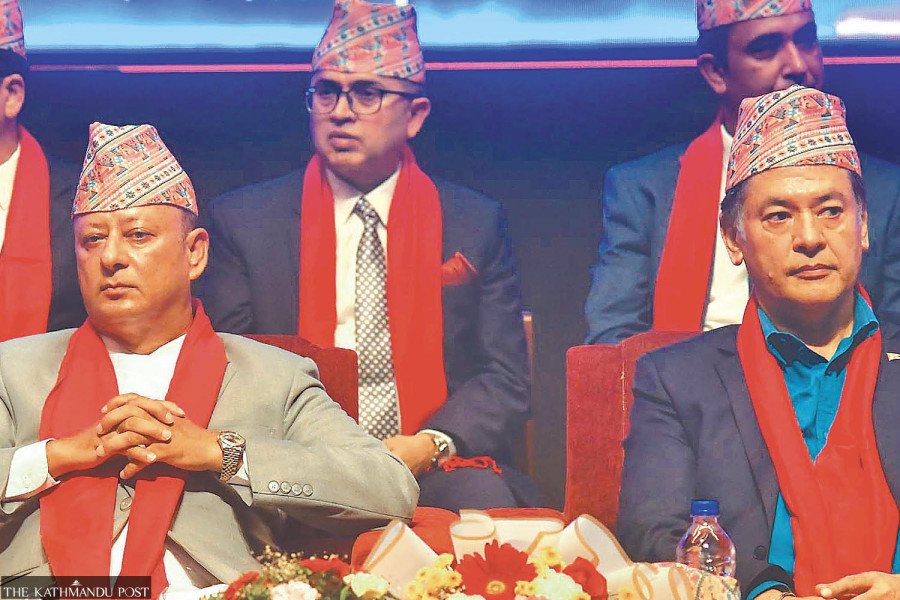National
Tussle brewing between Energy Minister Khadka and NEA chief Shakya
Insider says utility has been unable to pass its budget due to interference from Minister Dipak Khadka.
Purushottam Poudel
The Nepal Electricity Authority, one of the country’s most profitable public entities of late, has been mired in a serious internal conflict arising from the vested interests of the top officials responsible.
An NEA insider said the public utility has been unable to pass its budget because of the interference from Minister for Energy, Water Resources and Irrigation Dipak Khadka.
This has halted the procurement process and disrupted staff transfers. Disputes have also intensified over power purchase agreements (PPAs) and employee reshuffles.
The conflict between Minister Khadka and then-executive director Kulman Ghising escalated after Khadka assumed office, peaking between July and March. The row eventually led to Ghising’s removal, and Hitendra Dev Shakya was appointed the new executive director on March 24.
Since Shakya’s appointment, Minister Khadka has curtailed the executive director’s authority and exerted pressure on him to carry out staff transfers according to his wishes. When Shakya refused, tensions escalated, insiders say.
“The unwanted pressure from the minister had halted many functions of the NEA along with the passing of the budget,” the NEA officer said, wanting not to be named.
Multiple efforts of the Post to contact Minister Khadka for his comments were unsuccessful.
However, NEA spokesperson Rajan Dhakal denied the reports. Dhakal said that the board of directors decides most of the NEA’s procedural issues, which are not necessarily known to other staff members.
“If there is a tussle between Minister Khadka and NEA chief Shakya, it is not to my knowledge,” Dhakal said.
As a result, NEA’s annual budget has been held up. Without approval from the operating committee, procurement has nearly reached a standstill, affecting the purchase of essential items such as transformers, insulators and wires required for maintenance and new connections.
Minister of State for Energy Kham Bahadur Garbuja said that the NEA budget for this year has yet to be passed, but he did not blame the tussle between Minister Khadka and NEA chief Shakya for that.
The budget derailment is not due to a problem between Khadka and Shakya, Garbuja said, without elaborating.
A month of the fiscal year 2025-26 has already passed. The new fiscal year starts in mid-July.
According to NEA sources, the minister’s interests and pressure have hampered key issues, including the budget, staff transfers and PPAs. They warn that the ministers’ and senior officials’ vested interests could jeopardise the NEA’s overall performance, financial health and future.
Amid the NEA’s 40th anniversary celebration on Sunday, NEA chief Shakya reported a sharp decline in profits in comparison to the previous fiscal. The utility’s profits fell by 9.67 billion rupees in the fiscal year 2024-25.
According to Shakya, this is 37.32 percent less than the profit in 2023-24. In the financial year 2023-24, the authority’s profit before tax was 14.47 billion rupees.
However, Independent Power Producers’ Association Nepal (IPPAN) spokesperson Amar Baduwal said it is not a tussle with Minister Khadka but with utility chief Shakya. NEA is the sole buyer of hydroelectricity.
“The PPAs, even for 10 megawatts of electricity, have been halted despite the government relinquishing the ‘Take and Pay’ modality. In practice, it has not been scrapped,” Baduwal said.
In its annual budget announced on May 29, the government introduced the condition that electricity generators can carry out a PPA with the NEA only on a take-and-pay basis. The condition requires that the NEA purchase electricity generated by private producers only when there is demand.
After the government’s decision, IPPAN was ready for a protest, saying that with the take-and-pay policy, NEA will not be obligated to purchase or pay for electricity when it does not need it. If NEA does not purchase electricity, all the power produced will be wasted, as producers have no alternative buyers.
Dhakal, the NEA spokesman, said though the government decided to scrap the take-and-pay decision, the old policy remains unchanged in the written form.




 13.12°C Kathmandu
13.12°C Kathmandu














